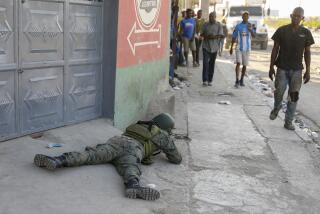Too Many Blue Helmets Still Unfilled
- Share via
WASHINGTON — In another setback for U.S. efforts in Iraq, the United Nations has been unable to secure enough troops to protect a U.N. contingent headed to the country to help with elections and rebuilding.
When the U.N. Security Council voted six weeks ago to authorize a protective force, it expected contributors to step forward. But countries have balked at taking part in a force expected to include 1,000 troops and several dozen bodyguards. Diplomats said many nations were hesitating because of the dangers -- including a wave of kidnappings -- and costs as well as the continuing unpopularity of the U.S. invasion.
“It’s a difficult problem for these countries, especially at a time when other countries [with troops in Iraq] are pulling out, or planning to leave ahead of schedule,” a U.N. diplomat said. “Discussions are continuing. So far no one has stepped forward.”
The U.S. considers a U.N. mission in Iraq an important step toward making the reconstruction a more international effort. But U.N. officials, still traumatized by the bombing of their organization’s Baghdad headquarters in August, said they couldn’t remain in Iraq for long unless they had protection for their personnel and their facilities.
If other countries are unable to provide the troops, the job will fall to the U.S.-led coalition now patrolling the country. That outcome would be embarrassing for the Bush administration, which has been struggling all year to show it has international support for rebuilding Iraq.
Some diplomats feared that protection by U.S. troops would make U.N. officials more likely to be attacked by insurgents. U.S. officials contended that insurgents would attack anyone -- including U.N. officials protected by foreign troops -- involved in reconstruction efforts.
Once in Iraq, U.N. officials will be responsible for helping prepare for elections in January, arranging for a national conference this summer that will enable Iraqis to choose a 100-member advisory council and assisting in the drafting of a new constitution.
U.S. officials remained convinced that countries would come forward to supply troops. “This is a work in progress,” a U.S. official said.
But the United States has been facing major challenges attracting and maintaining international support for its Iraq effort. After a two-week hostage drama, the Philippines finished pulling out its 51 military personnel Monday, bowing to a militant group’s demands for the withdrawal in exchange for a Philippine truck driver’s life. Norway will withdraw its military personnel from Iraq this month, and New Zealand and Thailand are expecting to bring their forces home in September.
There are also signs that the U.S. is having difficulty drawing other kinds of international support. Countries that have pledged to put up cash to rebuild Iraq have been slow to provide it.
Last week, U.N. Secretary-General Kofi Annan named Ashraf Jehangir Qazi, a Pakistani career diplomat, as the new U.N. envoy to Iraq. One diplomat said that Pakistan, Egypt, Bangladesh, Thailand and Australia have been under pressure to contribute troops for U.N. protection. Troops have also been requested from Algeria, Bahrain, Tunisia, Singapore, Nepal, Ukraine, Malaysia and Jordan, the diplomat said.
A U.N. official said a large number of countries had been approached about providing troops and other security personnel. “There are a number of lists, in fact,” this official said, adding that other proposals were being floated to groups of countries that U.N. officials think would work well together.
U.N. officials did not approach the French or Germans, who frequently contribute to international peacekeeping operations, because leaders made clear they would not provide troops for Iraq.
France and Germany strongly opposed the war.
Some countries have said they are willing to send troops, provided that wealthier nations pay for their upkeep, provide transportation and cover other costs, officials said.
The problem, some diplomats suggested, lies in part with the United Nations: It has not pushed hard enough to round up forces, they contended.
“There is growing frustration in member capitals with the complete apathy with which the U.N. has approached this issue,” said one diplomat, who asked not to be identified. “There’s a feeling that they need a kick in the backside. If they don’t ask, they’re not going to find contributors.”
Nancy Soderberg, a U.S. envoy to the United Nations during the Clinton administration, said the reluctance to contribute troops showed that many countries “are not willing to go into a war that they didn’t support and bail the United States out. They’re just not going to do it.”
In addition, after the bombing that killed U.N. envoy Sergio Vieira de Mello and much of his staff last year, Annan is reluctant to move a large contingent quickly into Iraq, said Soderberg, now a vice president with the nonprofit International Crisis Group, which is dedicated to resolving world conflicts.
Annan has “the weight of the loss of ... those workers on his shoulders, and he’s not prepared to go back into Iraq until conditions on the ground are right,” Soderberg said.
More to Read
Sign up for Essential California
The most important California stories and recommendations in your inbox every morning.
You may occasionally receive promotional content from the Los Angeles Times.











